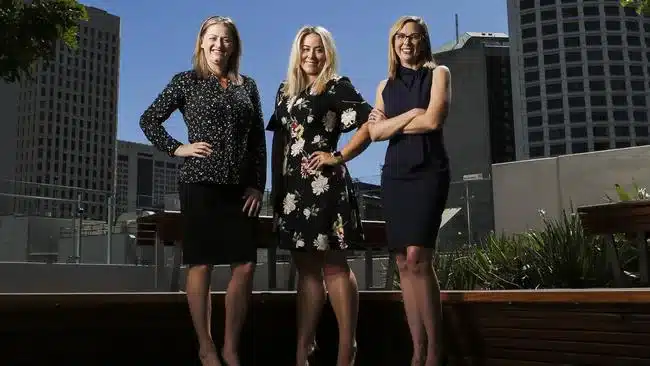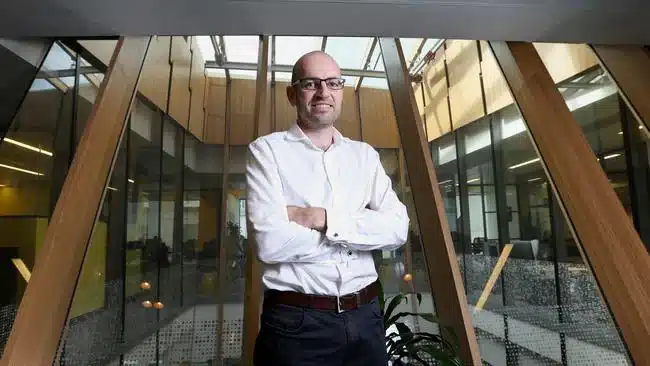Note: This article was published by The Courier Mail.
In Brisbane CBD, top barristers charge $50,000 for expert opinion. Just a few blocks away is a start-up using algorithms to prepare legal briefs for just a few hundred dollars in a move threatening to shake up the entire profession.
Lawyers with laptops are standing shoulder to shoulder with silk and wig advocates, who are trying to hold on to their power and prestige. The newcomers argue the sector and its pricing is anachronistic, lacks transparency and is ripe for disruption. Up for grabs is a whole new market of clients previously priced out of legal services but also a complete redefining of what legal advice even means.
Katie Richards is the founder and sole owner of Virtual Legal, an online law firm started four years ago and based in Brisbane but with no actual office for clients.
Richards has the ambitious goal of running a global law portal to reach the 85 per cent of the world currently priced out of legal advice.
She has developed systems to automate documentation across commercial law, with pricing listed online, and while she doesn’t meets clients in person, her innovations include personality testing so she can tailor advice to suit individuals.
“Some clients will prefer short, sharp responses so if you bombard them with information they … won’t even read it,” she says. “But then other types will want to read and research, and so if you rush them to make a decision it won’t work.”
The 2015 Telstra Queensland Business Women’s Award finalist is a registered lawyer in Australia and New Zealand, and is currently studying to pass exams in the UK this year and the US the next.
“Most of the innovation is around high-touch, high-risk areas like conveyancing. I travel the world to tech events because legal people have been the slowest on earth to change,” she says.
As well as automated documents, lawyers could soon be using algorithms to draw up case law and in the near future robot judges will be commonplace, according to Brisbane lawyer Russell Templeton.
Templeton is deep into a joint venture to modify patented prediction software used by Australian defence services for the legal world.
His new company Legal Logix will soon offer family law property settlement products where a consumer will go online, pay a few hundred dollars and be able to produce a downloadable brief to take to court. For a few hundred more, the program will draw on case law, family court processes and circumstances to give the client an expected property settlement outcome to use in negotiations.
He says property settlements are ideal for automation because the law is clear and there’s a large number of people who can’t afford lawyers for family court. He predicts the technology will make some solicitors obsolete.
“This is something that costs thousands or tens of thousands under the traditional model of going to see a lawyer … solicitors in this (new) model are a terminal game.”
With careers built on calculating risk, lawyers are perfectly placed to be innovators, according to the founders of Helix Legal – winner of the Law Society’s innovation award this year just months after launching.

The company has no time recording or billing and offers tech solutions, such as an app to allow subcontractors to manage financial risk.
“New law is about looking at the traditional model and seeing ways that it can be done differently to benefit the client and lawyers,” co-founder Janelle Kerrisk says.
That has been the approach of former corporate lawyer Warwick Walsh, who launched Lawcadia in 2015, a start-up tech company that allows legal firms to tender for cases.
Walsh has created an online marketplace connecting lawyers with companies, which provides transparency with tendering and payment. He says with the traditional model clients end up with much larger bills than expected and law firms can miss out on jobs, despite the final price ending up much larger than what was quoted by opposing firms. Using his model, the pricing is much clearer.
“I felt the way companies would procure legal services would develop very quickly and I felt there was a real gap in the market.”

Walsh has signed up major businesses to Lawcadia and recently secured a $500,000 investment from the Queensland Government’s Business Development Fund.
He says previously, the legal sector had been very risk-averse by its nature, making trying new things within the industry challenging.
“Over the last 18 months innovation is much more on law firms’ radar,” he says.
Watching from the sidelines are regulators who admit they are in uncharted territory about how to monitor the booming new law industry.
Queensland Legal Service Commissioner Paul Clauson says it’s going to require a federal approach instead of the current state system that accredits lawyers and investigates complaints of misconduct. He says regulation needs to address concerns such as whether people running a legal website from overseas need a Queensland practising certificate.
“Frankly, this is going to be a new world and it’s going to require a national approach,” Clauson says. “Lawyers may eventually be more software developers than face-to-face ‘real law’ advisers.”

